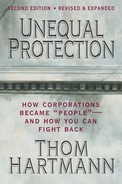CHAPTER 17
Unequal Privacy
The right of the people to be secure in their persons, houses, papers, and effects, against unreasonable searches and seizures, shall not be violated...
—Fourth Amendment to the Constitution of the United States, guaranteeing privacy from snooping
WHO READS YOUR MAIL? NOBODY? IT DEPENDS WHAT SYSTEM YOU USE FOR communication.
Paper mail that is delivered by the government-run U.S. Postal Service carries legal protections for the privacy of our communications. Nobody, at least without a court order, can read our letters or track what we send and receive.
But if you send an e-mail, the corporation that provides your Internet access can keep track of who you correspond with, what Web sites you visit, and everything you write, read, and view. Even after the terrorist attacks on the World Trade Center and the Pentagon in September 2001, the FBI needed an act of Congress to get that kind of power, even in limited form. But the corporations who transmit our e-mail have had it from day one.
And not only can multinational media corporations track our individual Internet activity, they do. If I walk around in my local bookstore, Bear Pond Books, nobody is following me and noting every book I pick up and look over. But when I browse the Web, both my Internet provider and the owners of the Web sites I visit may know who I am and what I’ve looked at. In fact, unless we intentionally install or activate security software, it’s highly likely that they do know where we’ve been. That’s because when I click on a Web site, it sends a coded signal through my Internet company and to the Web site host. Both of them can easily record my clicks—at practically no cost to themselves.
In our increasingly electronic age, there’s more: the corporation that sells me telephone service keeps complete records of whom I call, where, and when. If I had digital interactive cable television, the cable corporation could keep a list of every program I watch and when.
Microsoft got a lot of publicity because, according to the online journal PCWorld.com, “It was unaware that a feature in its Windows 98 operating system was transmitting a hardware serial number to a Microsoft server, even if the user had requested that the number not be sent.” Microsoft said it would take two months to make it stop sending the information. In a similar glitch, Microsoft said its Office software was accidentally inserting a unique ID code into documents that could be used to track where a document originated.1
“Unaware”? “Accidentally”?
One thing Americans value very highly is their Fourth Amendment right to privacy, and polls have shown that it’s one of the few issues that will get Americans out of their seats on Election Day. That fact should be even more persuasive to legislators than campaign contributions, although in 2008 while on the campaign trail, Senator Barack Obama went back to Washington, D.C., to vote for a Foreign Intelligence Surveillance Act (FISA) bill that gave protections to AT&T and other companies accused of illegally violating our privacy at the illegal request of the Bush administration (which was also protected by that vote).
While the names of only a few of the participants in the Boston Tea Party are known today, more than 220 years later such anonymity is impossible. And without anonymity, the skeptics argue, anybody who would try to shift power away from corporations and back to the people can be neutralized before they have a chance to be effective. Access to the media is denied, whistleblowers often find themselves unemployable and without resources, and, in a worst-case scenario, they may suff er the fate of Karen Silkwood, who was murdered on her way to share corporate inside information with a reporter.
Corporations Want Privacy—for Themselves but Not for Humans
Although corporations keep all their constitutional rights as a person intact throughout the business day and night, seven days a week, 365 days a year, the Supreme Court has ruled that when a human steps onto the corporate-owned property of his or her employer, that human is voluntarily giving up his constitutional rights to privacy, freedom from search, and free speech.
Your employer can read your e-mails, monitor your computer use, secretly photograph you, listen in on your telephone calls, fire you if you say things it doesn’t like (even unrelated to work), and even demand that you provide samples of your bodily fluids or subject you to external and internal physical examinations.
At the same time, however, the corporation you work for continues to assert its full constitutional rights against these same types of “interference” by the representative of humans—the government. The EPA can’t inspect a chemical factory without the permission of the corporation that owns it, but that same corporation can inspect its employees in the minutest detail without their permission.
Additionally, information about U.S.-based multinational corporations is not available in the following areas because those corporations are entitled, as persons with privacy rights, to keep secret:
• How much they pay overseas workers
• How many overseas employees they have, or where
• Levels of toxic emissions from their plants overseas, or of those of their contractors
• Where they have overseas plants or contractors2
In a Democracy...
Not only was it not always this way in America, but it’s the opposite of what the Founders of this nation intended. In a democracy this can change.
